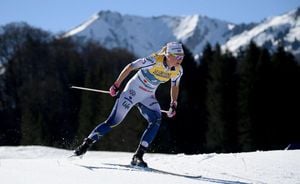With the winds of conflict still swirling through Eastern Europe, the focus remains on the complex issue of prisoner exchanges and the political repression tied to the war between Ukraine and Russia. Recently, both countries reported significant developments concerning the exchange of soldiers and the escalation of legal actions against dissenters, particularly within the Kremlin.
On the one hand, Ukraine announced the return of over 500 bodies of its fallen soldiers, which were repatriated from various conflict zones, primarily the heavily contested Donetsk region. This significant return operated under the Coordination Headquarters for the Treatment of Prisoners of War, which commended the assistance of the International Committee of the Red Cross. They stated, "We are grateful for the assistance of the International Committee of the Red Cross." From the total amount, 397 bodies come from Donetsk, with others returned from Luhansk and Zaporizhzhia. This repatriation is part of longstanding practices observed since the conflict's inception, showcasing both nations’ commitment to honoring their fallen troops, even amid civil unrest and accusations of human rights violations.
Meanwhile, on the Russian side, the repression of dissenting voices has intensified. The recent case of Alexei Gorinov, a former member of the Moscow municipal council, starkly exemplifies this growing intolerance. Gorinov was tried and convicted for speaking out against the war, particularly for criticizing Russia's military actions during local council meetings. Initially sentenced to seven years, he received three additional years recently, bringing his total to ten-year imprisonment under harsher conditions than those he already faced. His attorney indicated this new sentence signifies the Kremlin’s increased grip on freedom of expression. Gorinov's legal troubles reflect broader fears among the Russian opposition, illustrating the high stakes of speaking out against the government’s military actions and policies.
This crackdown is part of the Kremlin's broader strategy to eliminate dissent, exemplified by swift trials and harsh sentences like Gorinov's, which have become more frequent as the war drags on. Independent news outlets, like Mediazona, have highlighted these cases, underscoring how individuals with any semblance of opposition are increasingly silenced.
These narratives indicate two parallel paths during the war as both countries grapple with loss, moral obligations to their soldiers, and the lengths to which governments will go to manage public perception. Ukraine’s focus on identifying and honoring its fallen reflects its struggle to maintain national pride and resolve, especially under dire circumstances. Conversely, Russia’s suppression of dissent resonates with the regime's intent to project strength and unity, subduing any calls for peace or questioning of the war effort.
The prisoner exchanges and the stories surrounding them are laced with emotional weight, representing not just the numbers of soldiers returned or remaining but the families they leave behind. Many Ukrainians express gratitude for the repatriation of their loved ones yet grapple with intense grief for the lives lost. Social media platforms and local news reflect these sentiments, displaying heartbreaking tributes and memorials as communities mourn the sacrifices made.
While the realities of war continue to take center stage, the involvement of international organizations like the Red Cross highlights broader humanitarian efforts amid these tragic circumstances. The organization serves not only as mediators for exchanges but also provides assistance for the families of the deceased, hoping to ease their burdens as they navigate the aftermath of conflict.
A notable juxtaposition arises when considering public opinion within both nations. Ukrainians have shown resilience and unity against perceived aggression from Russia, cultivating support for their government, which has taken steps to strengthen military capabilities. Conversely, the atmosphere in Russia reflects fear and repression, as citizens often keep dissenting opinions to themselves to evade the wrath of authorities, echoing Gorinov's situation and engendering broad feelings of despair.
International response to these developments remains guarded. While many nations continue to voice their support for Ukraine through military aid and humanitarian assistance, there is increasing concern for Russian citizens caught within the regime's oppressive measures. Global organizations, political analysts, and leaders reflect on the moral and ethical dilemmas posed by the dual realities of honoring soldier sacrifices and quelling dissent.
The psychological impacts of these conflicts penetrate deeply through society, as both nations grapple with their identities amid war. Ukrainian society emerges from this crisis, affirming its desire for sovereignty and self-determination, showcasing the close ties between the military and national pride. Meanwhile, Russians face conflicting emotions as they navigate loyalty to country versus the ethical dilemmas posed by governmental actions against dissenters.
What remains true at the heartbeat of this multifaceted situation is the continued relevance of human lives. Soldiers at the fronts represent not simply casualties but sons, daughters, brothers, and sisters. The pain stemming from lost lives, whether through battle or through the loss of liberty for speaking out against aggression, highlights the deeply human aspect at the center of this conflict.
Given these contrasting narratives involving prisoner exchanges and political oppression respectively, the world watches closely. The outcomes, as they continue to evolve, will not only shape the future of these nations and their people but will also provide insight for others grappling with the shadows of war.
The focus shifts now as the international community awaits new developments on the battlefield and beyond, with pressing questions remaining about how long this tumultuous conflict will continue and the cost it extracts from both sides.



